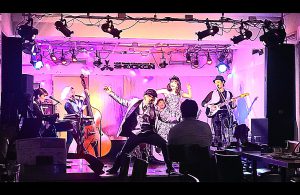秩父幻景 ―魂の巣くう谷を越えて―
- 2024.12.04
- 月刊芳美
秩父幻景 ―魂の巣くう谷を越えて―
序章:風の囁き
十一月、紅葉燃ゆる秩父の山々に風が巻き上がる。
それはただの風ではなかった。地を這い、谷間を嘆き、木々の間に魂を吹き込む「声」だった。
かつて農民たちの汗と血を吸ったこの土地は、彼らの嘆きを覚えていた。だがその声は、もはや単なる嘆きではなかった。それは怒りであり、願いであり、何よりも「抗い」であった。
風の囁きに導かれるように、ひとつの村が蜂起した。下吉田の灯火が燃え、夜空に鋭い狼煙が立つ。それは秩父を囲む山々に住む、目に見えぬ者たちへの合図だった。
第一章:影の行進
下吉田村の集会所に集まった者たちは、顔を隠した影のようだった。誰もが借金の重圧に苦しむ農民や労働者たちだったが、その夜、彼らはただの人間ではなかった。
「ここに我らの誓いを刻む」と、男たちが叫ぶ。その手に握られていたのは、血に染められた鋤と鍬、そして松明だった。
「負債を四十年に分けて償却する。我らの魂を四十年の彼方まで伸ばすのだ!」
しかし、集団の中には一人の男が立ち尽くしていた。彼の名は鷹男(たかお)。もともとは警官だったが、この異形の夜に何かに突き動かされ、己の任務を忘れて影の一部となったのだ。
その時、天の彼方から竹法螺の音が響く。男たちはぞろぞろと行進を始める。それは人間の群れではなかった。彼らの背後に、不気味な影たちが蠢いていた――怨霊、原罪、そして秩父の山々に巣くう何か。
第二章:山の神々
行進は小鹿野の町に向かう。町の住人たちは、遠くから迫る炎の光と影の蠢きを見て、震え上がっていた。彼らが知らないのは、そこにはただの人間の集団ではなく、「秩父の山の神々」が降臨しているということだった。
「彼らの怒りは正当か?」と問いかける老いた巫女がいた。彼女の目には、行進する者たちが光と闇の二重の姿に映る。彼らは農民であり、同時に古き神々の化身でもあった。
鷹男は行進の中で、己の内なる声に問いかける。
「私は何のためにここにいる?」
その時、彼の目の前に立ちはだかったのは、白く光る巨木だった。巨木は口を開き、こう囁いた。
「お前の役割は見届けることだ。だがそれが終われば、お前はこの世のものではなくなる。」
第三章:幻視の谷
やがて行進は大宮へと達した。警察署や裁判所が焼き討ちに遭い、書類が灰となって風に舞う。その灰はまるで彼らの失われた希望や未来の象徴のようだった。
しかし、その夜、鷹男の目には現実が歪み始める。人々の顔は次第に人間のものではなくなる。ある者は狼の頭を持ち、ある者は山鳥の羽を生やし、ある者は骸骨そのものとなっていた。彼らはただの農民ではなかった――彼らは「元型」そのもの、抑圧された集団の無意識が形を取った存在だった。
竹法螺の音が高まり、ついに鷹男の意識は裂ける。彼の視界は一転し、秩父の山々の幻影が広がる。そこでは死者たちの踊りが繰り広げられていた。
「ここが終わりの地か?」
「いや、これはただの通過点だ」と声が答える。
第四章:イリュージョンの彼方
幻視の中で鷹男は、一人の女に出会う。彼女は穏やかな顔で言う。
「あなたたちの怒りも、私たちの怒りも、この世のものではない。ただ、山と谷がそれを抱えるのだ。」
女は彼を山の頂に導く。そこから見えたのは、夜空に広がる無数の光の帯だった。それは星々ではなく、未来へと繋がる魂の流れだった。秩父事件の農民たちの行為は無意味ではなかった。だが、それは誰かに理解される必要もなかったのだ。
「さあ、行きなさい」と女が告げる。鷹男は目を閉じ、イリュージョンの彼方へと飛び込む。彼の姿は光の粒となり、やがて夜空へと溶け込んだ。
終章:風の巣くう谷
そして秩父の谷間には再び静寂が戻る。
だがその静寂の底には、いまだ語られざる物語が眠っている。竹法螺の音が時折風に混ざり、人々の耳に届く時、それは過去が未来を照らす瞬間だった。
秩父事件――それはただの蜂起ではない。それは魂の行進であり、集団の無意識が形となり、現実と幻影を繋ぐ架け橋であった。そして、それを越えていった者たちは、もはや生と死の境を超えた存在へと変わる。
彼らの物語は消えない。それは谷を吹き抜ける風となり、山々に囁き続ける。
💕
The Phantom March of Chichibu – Beyond the Illusion
Prologue: The Whispering Wind
November’s winds swept through the crimson leaves of the Chichibu mountains.
But this was no ordinary wind. It crawled across the earth, lamented in the valleys, and breathed life into the trees—a voice.
This land, soaked in the sweat and blood of farmers long burdened by debt, remembered their cries. Yet now, the voice was no longer just a lament. It was anger, hope, and most of all, resistance.
Drawn by the whispering wind, a single village rose. The flames of Shimoyoshida burned bright, and a signal fire pierced the night sky. It was a summons not just to the people but to the unseen spirits that had long dwelled in the Chichibu mountains.
Chapter 1: The March of Shadows
In the meeting hall of Shimoyoshida, the gathered men were shadows cloaked in anonymity. Farmers and laborers crushed under the weight of loans and taxes, they no longer appeared as mere men that night.
“We swear to inscribe our resolve here,” a voice bellowed. The tools they wielded—bloodied hoes, sickles, and blazing torches—seemed imbued with a power beyond mortal rage.
“Forty years to repay our debts. We will stretch our spirits across forty years of penance!”
Yet amidst the fervor stood a single man, silent and still. His name was Takao—a former policeman who, compelled by some mysterious force, had abandoned his post to join this shadowy procession.
Then came the distant sound of a bamboo conch horn, reverberating through the heavens. Slowly, the march began. But these were not mere mortals advancing. Beneath their feet trailed unearthly shadows—specters of resentment, ancestral guilt, and something older, something far more primal lurking in Chichibu’s ancient peaks.
Chapter 2: Gods of the Mountains
The procession wound toward Ogano. Townspeople, trembling, watched from afar as a fiery glow spread across the horizon. But what they could not see was that this was no mere rebellion. This was a descent of the gods of Chichibu.
“Are their grievances just?” an aged shrine maiden murmured to herself, peering from the shadows. To her eyes, the marchers flickered between their human forms and luminous, otherworldly beings. Farmers they were, but also incarnations of forgotten deities and spirits.
Takao, caught in the march, wrestled with an inner question.
“Why am I here? What is my purpose?”
Before him rose a radiant white tree, its roots twisted like veins. The tree spoke without words, a voice echoing in his soul.
“Your task is to witness. But when that is done, you will no longer belong to this world.”
Chapter 3: The Visionary Valley
The march reached Ōmiya, where police stations and court offices were set ablaze. Documents turned to ash, their remnants swirling in the wind like fragments of a shattered future.
But by now, Takao’s perception had begun to fracture. The faces of those around him distorted. Some bore the heads of wolves; others sprouted the feathers of mountain birds; still others were pure skeletons, illuminated by an otherworldly glow. These were not simply farmers—they were archetypes incarnate, the collective unconscious of the oppressed made manifest.
The conch horn’s wail grew louder, shattering the boundary of Takao’s mind. His vision warped. The world dissolved into a kaleidoscope of the Chichibu mountains. Before him danced the dead, their spectral forms swirling in a great, primordial rhythm.
“Is this the end?” Takao whispered.
“No,” came the reply from a disembodied voice. “This is merely a crossing.”
Chapter 4: Beyond the Illusion
In this realm of visions, Takao encountered a woman. Her face was serene, yet her presence carried the weight of millennia.
“Your anger and ours are not of this world,” she said, her voice like a flowing stream. “It is the mountains and valleys that bear it.”
The woman guided him to the summit of the mountain. From there, Takao saw countless streams of light weaving across the night sky. These were not stars but the souls of countless generations flowing toward an unseen horizon.
The farmers’ rebellion was not meaningless. But it required no validation, no comprehension. It was an offering to time itself, a fragment of eternity expressed in the fleeting flame of mortal struggle.
“Go now,” the woman whispered. Takao closed his eyes and leapt into the beyond, his form dissolving into light. As his particles scattered, they ascended, blending into the stars.
Epilogue: The Valley of the Whispering Wind
Peace returned to the Chichibu valley.
But beneath the silence, untold stories continued to sleep. From time to time, the mournful call of the bamboo conch drifted on the wind, brushing against the ears of the living.
The Chichibu Incident was no mere uprising. It was a march of souls, a manifestation of the collective unconscious that bridged the realms of the tangible and the illusory. Those who crossed that bridge transcended the bounds of life and death, leaving behind only the whisper of their passage.

Their tale endures, carried by the winds that ripple through the mountains, whispering secrets to those who dare to listen.